How Much Does EV Charging App Development Cost?
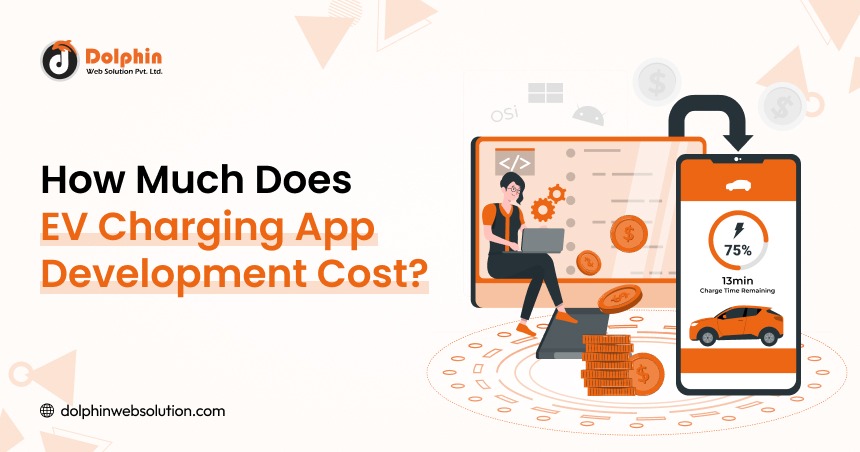
Table of Contents
Summary :
Are you planning to build an EV charging app but don't know the estimated EV charging app development cost? This guide will help you find the estimated cost of building an EV charging app from scratch and the factors that can influence the price and total cost of an EV charging app.
The electric vehicle (EV) industry has grown rapidly, and now there’s a big shift towards EVs globally.
According to the stats, the global EV market is expected to reach $1,891.08 billion by 2032, with a CAGR of 13.8%. It clearly shows how fast the demand for EVs is growing rapidly.
As more people are switching to EV cars, the need for EV charging stations is also increasing. But one of the critical challenges is to find the nearest EV station, mainly due to its new infrastructure.
This is where EV charging apps are gaining huge popularity; people can use these apps to find the nearest EV charging stations, check availability, and make online payments in one app.
Many businesses find the idea of building EV charging apps useful and they are planning to develop EV charging apps to help users find the EV station smoothly.
However, it’s not easy as it seems to build an EV charging station app, and it involves several factors. Don’t worry!
In this guide, we will help you understand everything about EV charging apps, the entire process of building an EV charging app, the factors that can affect the development cost, and the estimated EV charging app development cost.
So, without any further delay, let’s dive in!
What is an EV Charging Application?
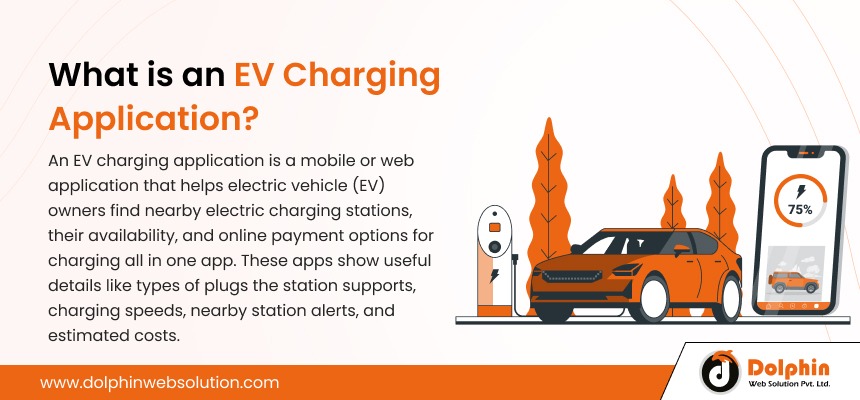
An EV charging application is a mobile or web application that helps electric vehicle (EV) owners find nearby electric charging stations, their availability, and online payment options for charging all in one app. These apps show useful details like types of plugs the station supports, charging speeds, nearby station alerts, and estimated costs. Plus, some apps show more in-depth details like user ratings, real-time availability, and station images to spot quickly. These apps help EV car owners to keep their cars charged, especially when traveling long distances.
Here are some key features of EV charging apps:
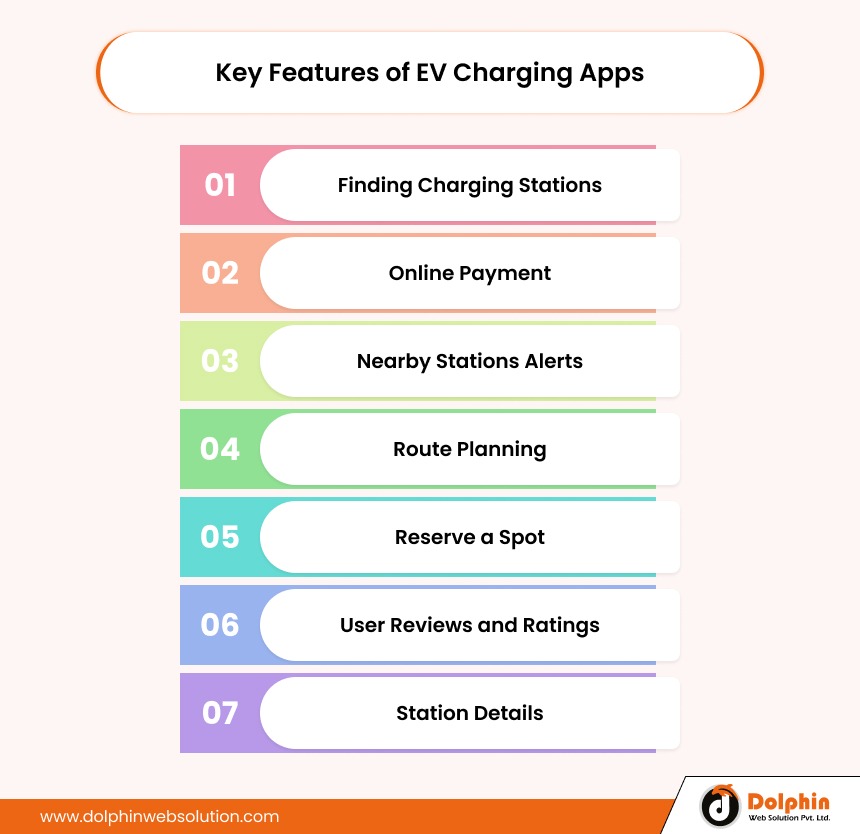
- Finding Charging Stations: It helps EV car owners find the nearest EV charging stations.
- Online Payment: It allows users to pay online through the app at their convenience.
- Nearby Stations Alerts: Whenever a nearby station arrived, users received alerts.
- Route Planning: Users can plan their route to get several charging stations.
- Reserve a Spot: Some apps also allow users to book a charging spot in advance as per their suitable timing.
- User Reviews and Ratings: It displays users’ reviews and feedback to help with station selection.
- Station Details: It shows important details like plug types, charging speeds, availability, and station images.
Factors Influencing EV Charging App Development Cost
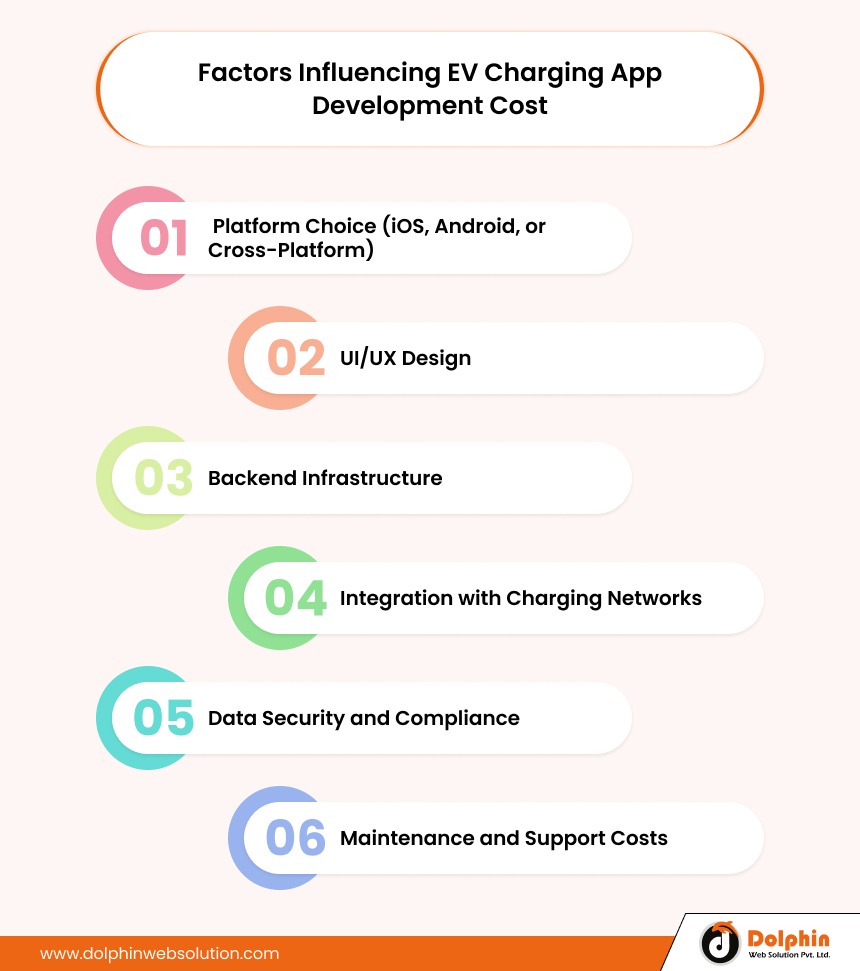
Here are some key factors that can influence EV charging app development costs:
1. Platform Choice (iOS, Android, or Cross-Platform)
When building an EV charging app, the first thing to consider is platform support. Are you planning to make your app for Android, iOS, or both? However, EV car owners need EV charging apps despite Android and iOS. So, it’s preferable to have cross-platform support and expand your EV charging app reach. Luckily, you don’t need to create a separate app for Android and iOS with the help of React Native, which developers can use to build a react native app that can support both OS. It helps to reduce the time and app development cost In India and allow apps to work on any device and OS smoothly.
2. UI/UX Design
The UX/UI design of EV charging apps is another key factor that every business needs to focus on. Because UI/UX design allows users to easily access the app and its functionalities, the cost of UI/UX design can vary based on design and in-depth functionalities. A well-designed UI/UX app leads to high user satisfaction and an advanced level of UI/UX leads to high development cost.
3. Backend Infrastructure
The backend development of an EV app is quite complex because it handles large amounts of data, requires up-to-date information on EV charging stations, user information, and reviews, and ensures the app provides real-time details about charging stations. A strong backend is the backbone of the app and make sure you’re building a reliable and scalable backend to deliver smooth performance.
4. Integration with Charging Networks
Integrating multiple charging networks is one of the crucial features in the EV charging app because you’re building a business and want to list several EV stations in the app. However, integration is a complex process, and adding such features takes time, effort, and high EV charging app development costs.
5. Data Security and Compliance
If there’s an app that contains data, then it must secure sensitive information from hackers, especially EV charging apps, which contain large amounts of data with updated information. An EV charging app must follow strict regulations such as GDPR (General Data Protection Regulation) to protect data and prevent data breaches. Strong security measures are essential to protect future extra spending and brand reputation.
6. Maintenance and Support Costs
Maintenance and support are both essential for every app. Especially apps like EV charging apps require up-to-date data about charging stations. So, make sure to provide robust maintenance and ongoing support to fix any issues that arise in the app and let the users run the app smoothly.
Development Team Composition and Hourly Rates
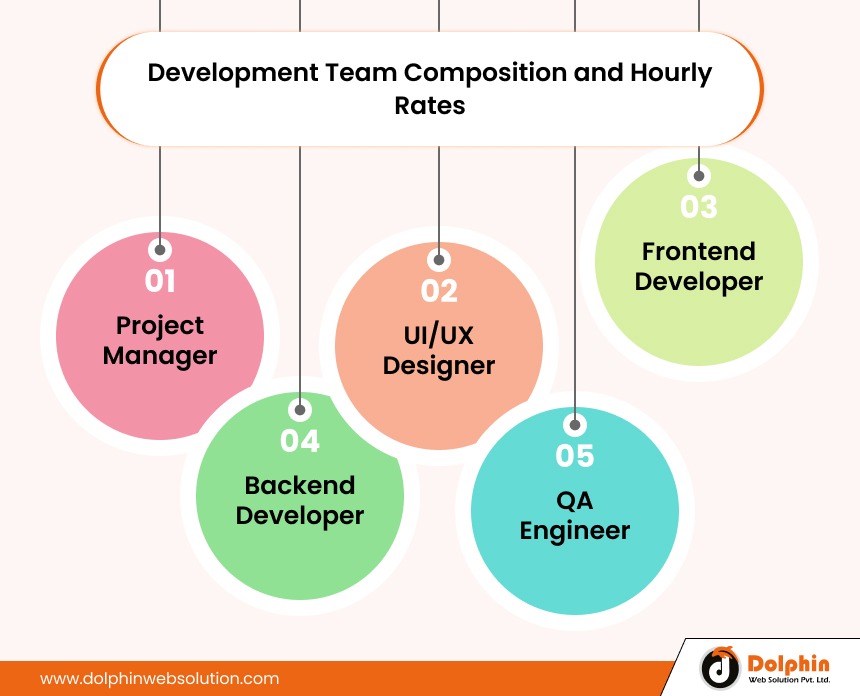
When you are building an EV charging app, a skilled professional team needs to build a fully-functional app. Here’s a breakdown of critical roles and their estimated hourly rates for building an EV charging app:
1. Project Manager
The project manager manages the entire app development process and ensures everything from concept to launch will be completed on time and under budget. They act as a middleman between the client and development team to update the clients about the progress and coordinate with teams to resolve any issues that arise during the development. The average hourly rate for a project manager ranges from $30 to $55 per hour, depending on their experience and location.
2. UI/UX Designer
UI/UX designers play another vital role in developing the EV charging app. They help to build the interface of the EV charging app. So that users can interact with the app smoothly and use its functionalities with minimal effort, overall enhancing user satisfaction. The UI/UX design average hourly rate ranges between $20 to $60 per hour.
3. Frontend Developer
Frontend Developers are mainly focused on building the front side of the app interface, which is the app’s look and feel, implementing UI/UX design in the app, and ensuring it works smoothly across all devices and screens. The estimated hourly rate of frontend developers ranges between $20 to $50 per hour.
4. Backend Developer
Backend developers are responsible for the backend operations of the app from the server-side logic and database management. So that users can use all the app’s functionalities without any issues. They handle the integration and ensure all the features work correctly in the app. So that app performs smoothly and allows businesses to scale as per the demand. The average hourly rate of backend developers ranges from $20 to $50 per hour based on experience and location.
5. QA Engineer
QA (Quality Assurance) engineers also play a crucial role in ensuring that the app is bug-free after development and that all the features are working properly. The QA team will test the app on multiple devices and environments to spot errors and fix them immediately. It ensures that the final product is ready to launch in the market and users can smoothly use the app. The average QA engineer hourly rate ranges between $20 to $40 per hour.
Approximate Total Cost of Developing an EV Charging App
The average cost of building an EV charging app can range between $10,000 to $250,000. However, several factors affect the cost of building an EV charging app, including its type and complexity. To accurately estimate the EV charging app development cost, here’s a simple breakdown:
- Basic EV Charging App: If you want to build a simple EV charging app that can help users find the nearest EV charging stations, then this type of app with limited features can cost between $6k to $100k with an estimated time of 3-5 months.
- Mid-Level EV Charging App: If you are looking for a feature-rich EV charging app that includes real-time monitoring, remote accessibility, and user authentication, then such mid-range feature apps can cost between $30K-$250K with an expected timeline of around 6-9 months.
- Advanced EV Charging App: If you are looking for an advanced-level app with complete customizations, premium integration, and high-end features, then its budget can go from $150k or more with an estimated timeline of 6-12 months.
Conclusion
The EV charging apps are gaining huge popularity with the growing infrastructure of EVs globally. If you are planning to build an EV charging app, make sure you’ve done your proper research and estimated the cost of EV charging app to jump to the development. Hopefully, this guide helps you understand everything about EV charging apps, including the functionalities they require, factors that can affect the development cost, and estimated costs for building an EV charging app. Now, it’s your turn to hire an experienced mobile app development company and let the professionals build your EV charging app under budget and on-time.

Hello!
Click one of our contacts below to chat on WhatsApp

